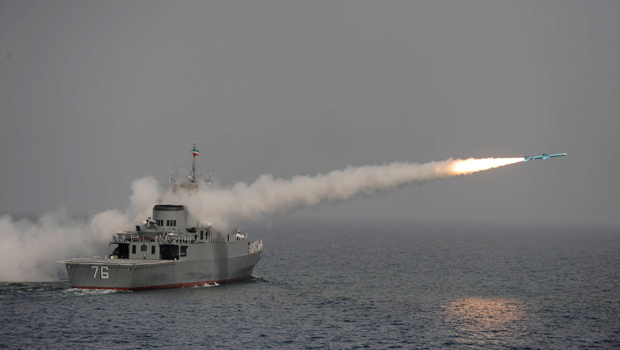It can be mounted on speed boats and other light vessels, can withstand electronic warfare, and is able to fly in low altitudes to avoid detection, the report said.
Iran has a fleet of speed boats that often challenge US and allied warships in the Gulf. The vessels are usually controlled by the elite Revolutionary Guards and can be equipped with missiles.
The Islamic republic says it has a wide range of missiles. It says some are capable of striking targets inside Israel as well as Middle Eastern military bases of its other main archfoe, the United States.
Tehran regularly boasts about developing missiles having substantial range and capabilities, but Western military experts cast doubt on its claims.
Meanwhile, Iran's powerful Revolutionary Guard began military exercises Saturday in the country's south, the latest show of force after threats to close the strategic Strait of Hormuz in retaliation for tougher Western sanctions.
Plans for new Iranian naval games in the Gulf off the country's southern coast have been in the works for weeks. State media announced new maneuvers in southern Iran involving ground forces, but it was not immediately clear whether they were part of the planned naval training missions scheduled for this month or a separate operation.
The latest military maneuvers got under way following stern warnings by Iran's Supreme Leader, Ayatollah Ali Khamenei, about any possible US or Israeli attacks against Tehran's nuclear facilities. It also comes after Western forces boosted their naval presence in the Gulf led by the American aircraft carrier USS Abraham Lincoln.
Iran officials and lawmakers have repeatedly said that their country would close the Strait of Hormuz in retaliation for sanctions that affect Iran's oil exports. They have as yet made no attempts to disrupt shipping through the waterway, the route for one-fifth of the world's crude oil, and the US and allies have said they would respond swiftly to any attempts at a blockade.
Last month, Iran's navy wrapped up 10 days of exercises in the Gulf, but the Revolutionary Guard — which is directly under control of the supreme leader — represents a significantly stronger military force and controls key programs such as missile development. Iranian state media announced the new maneuvers, but gave no further details.
Khamenei, in a speech nationally broadcast on Friday, staked out a hard line after suggestions by Israel that military strikes are an increasing possibility if sanctions fail to rein in the Islamic Republic's nuclear program.
In another development, about 50 exiled members of Iran's opposition are meeting in Stockholm to discuss how they can unite to promote democracy in their homeland and prepare for its parliamentary election in March.
Writers, academics and representatives of Iran's opposition parties are among the participants that are attending the two-day conference that began Saturday and that is being held at a secret location in the Stockholm region out of concern for security.
Laila Naraghi Coggiola, a spokeswoman for the organizers of the "Unity for Democracy in Iran" conference says it is mainly aimed at coordinating the increasingly fragmented opposition that is active outside of Iran.










